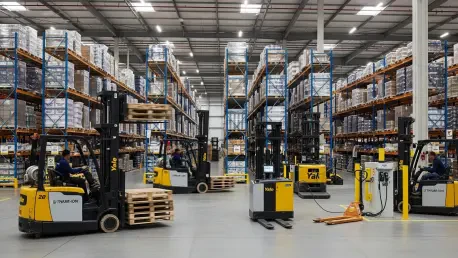In the high-stakes world of modern warehousing, where every minute of downtime can cost thousands of dollars, a quiet revolution is underway, transforming how operations meet the demands of a fast-paced industry. Picture a sprawling distribution center buzzing with activity, forklifts darting through aisles, and managers racing against the clock to meet surging e-commerce demands. The challenge is clear: how can operations keep up with relentless pressure while slashing costs and meeting strict sustainability targets? Yale Lift Truck Technologies has stepped into this arena with a game-changing solution—lithium-ion battery systems designed to power warehouse equipment with unmatched efficiency. This innovation isn’t just about energy; it’s about redefining how warehouses operate in an era of unprecedented demand.
Why Energy Solutions Are Transforming Warehousing
The warehousing industry stands at a critical juncture, grappling with a perfect storm of labor shortages, skyrocketing energy expenses, and mounting pressure to reduce environmental impact. Efficiency is no longer a luxury but a necessity, as third-party logistics providers and distribution hubs push equipment to the limit in multi-shift environments. Yale’s lithium-ion battery technology emerges as a beacon of hope, offering a way to address these challenges head-on with cutting-edge energy solutions.
This isn’t merely about replacing old batteries; it’s about integrating a holistic system that powers a range of equipment—from pallet trucks to reach trucks—with precision and reliability. By focusing on high-performance energy delivery, Yale is helping warehouses cut through operational bottlenecks while aligning with broader sustainability goals. Industry experts note that such advancements could redefine productivity standards, with some studies estimating up to a 30% reduction in energy-related downtime when using advanced battery systems.
The Dual Challenge of Productivity and Green Operations
Modern warehouses face an intricate balancing act: maintaining peak productivity while adopting eco-friendly practices. With labor costs rising and energy bills climbing, every piece of equipment must pull its weight without frequent interruptions for maintenance or recharging. Yale’s lithium-ion systems are engineered specifically for these high-pressure settings, delivering robust power to keep operations humming along.
Beyond performance, environmental responsibility plays a starring role in this technology. Unlike traditional lead-acid batteries, lithium-ion alternatives produce zero emissions, eliminating the need for ventilated battery rooms and reducing a facility’s carbon footprint. This dual focus on operational uptime and sustainability makes Yale’s solution a vital asset for businesses aiming to stay competitive while meeting regulatory demands.
Unpacking the Power of Yale’s Lithium-Ion Systems
At the heart of Yale’s innovation lies a seamlessly integrated system of lithium-ion batteries and chargers, tailored for a variety of warehouse equipment. These batteries boast high energy density, enabling rapid charging that slashes downtime in fast-paced, multi-shift environments. This means forklifts and reach trucks can get back to work faster, directly tackling the issue of lost productivity.
Safety and convenience are also prioritized in this design. Features like easy-access charging portals allow operators to recharge without hassle, while interlock sensors prevent accidents by disabling equipment during charging. Additionally, the emission-free operation supports opportunity charging in busy areas, freeing up valuable space and fostering a cleaner, quieter workplace. Available through Yale’s extensive global dealer network, this technology ensures compatibility and simplifies both procurement and upkeep.
Real-World Impact Through Industry Voices
The true measure of any innovation lies in its real-world application, and Yale’s lithium-ion systems are earning high praise from those on the front lines. David LeBlanc, President of Energy Solutions at Yale Lift Truck Technologies, highlights the technology’s transformative potential: “This system not only boosts productivity but also reduces strain on facility resources and power grids.” His words underscore a commitment to solving critical pain points in warehouse management.
Feedback from the field further validates this impact. A warehouse fleet manager recently noted, “With Yale Battery Vision telemetry, real-time data on battery status has cut our operational delays by nearly 40%.” Such testimonials, combined with Yale’s dedication to ongoing system updates for long-term compatibility, paint a compelling picture of a technology that’s built to last in demanding environments.
Implementing Yale’s Technology for Maximum Efficiency
For warehouses ready to embrace this cutting-edge solution, a strategic approach can unlock its full potential. Start by partnering with Yale dealers to assess specific energy needs, ensuring the right battery capacities and box sizes are matched to the fleet. This tailored selection process lays the foundation for seamless integration into existing operations.
Next, take advantage of tools like Yale Battery Vision to monitor battery health and optimize charging schedules in real time, preventing unexpected disruptions. Strategically placing chargers in high-traffic zones for opportunity charging leverages the system’s flexibility, while programs like Battery Box Replacement (BBR) offer sustainable options for managing aging batteries through second-life applications. With expert guidance from Yale’s dealer network on installation and lifecycle management, transitioning to fast-charging systems becomes a streamlined process that drives efficiency and cost savings.
Reflecting on a Milestone in Warehouse Innovation
Looking back, Yale Lift Truck Technologies set a powerful precedent with their lithium-ion battery systems, addressing the urgent needs of an industry under pressure. Their focus on blending high-performance energy with user-friendly design and real-time data integration marked a turning point for countless warehouses striving to stay ahead. The emphasis on customized solutions and dealer support proved instrumental in easing the shift to sustainable, efficient operations.
As businesses moved forward, the next steps became clear: explore how to scale these innovations across larger fleets and integrate them with emerging technologies like automation. Warehouses that took the initiative to assess their energy strategies and collaborate with experts found themselves better positioned to tackle future challenges. This journey highlighted a broader truth—investing in smart energy solutions was not just a fix for immediate hurdles but a foundation for long-term resilience and growth.









